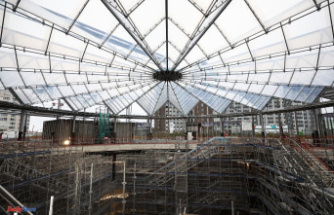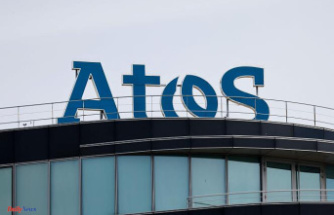Xi Jinping is the undisputed ruler of China. He puts tech companies on a leash, humiliated his predecessor and enforced the claim to power of the Communist Party he led. These are bad prospects for the economy.
Xi Jinping triumphs. China's head of state and party leader has cemented his power for years to come. He weeded out potential opponents from the leadership of the Communist Party and replaced them with loyal followers. At the party congress, predecessor Hu Jintao had to vacate his place on the podium next to Xi and was apparently led out of the hall against his will.
This is not good news for the development of the world's second largest economy. When Xi was re-elected five years ago, China's economy was booming. Today it looks completely different. And that has a lot to do with the 69-year-old. For around two decades, the People's Republic was the largest and most reliable engine of growth in the world economy. After the death of Mao Zedong, the Communist Party took a pragmatic approach to making the country richer and paired free-market reforms with state control - and very successfully so.
But China's ruler has changed that. He doesn't rely on pragmatism, but on ideology - on an ideology he has shaped. Xi's "Thoughts on Socialism with Chinese Characteristics" are not only part of the party charter, but can even be found in school curricula. Xi wants to reform state capitalism, which for years not only enabled a booming private sector, but encouraged it. The ultimate goal: like all other areas of society, the economy should be subject to full control of the party.
The economy is already suffering because of the global economic slowdown. There is also a severe real estate crisis. Unemployment is high; according to official figures, almost a fifth of young Chinese are unemployed.
Xi has dealt two more severe blows to economic development. On the one hand, there is its zero-Covid policy, in which individual outbreaks are immediately combated by sealing off entire districts. One consequence: Millions of people cannot get to their jobs, factories restrict production or temporarily close completely. This is a catastrophe for the economy.
But Xi has made this strategy a key tenet of his policies. State propaganda emphasizes that he has thus prevented high death rates as in the USA and Europe. But at the latest with the highly contagious omicron variant of the corona virus, the zero-Covid approach has reached its limits. Apparently, Xi doesn't have an exit strategy: many millions - especially older people - are not fully vaccinated. High numbers of infections are likely to lead to numerous deaths, especially since the Chinese health system is likely to be overloaded quickly.
On the other hand, Xi is concerned with asserting the absolute claim to power of the Communist Party he leads. He implemented a series of measures to bring the private sector under the control of the CP. The most obvious example is the technology sector, which has been booming for many years. For two years, Xi has imposed more and more regulations on tech companies. They target, for example, e-commerce giants, financial services companies, social media giants, tutoring providers, the delivery service industry and the online video games sector.
Many billionaires and business leaders have disappeared in China in recent years. For some of them it is still unclear what became of them. However, most of them reappear. Some of them are tried - mostly because of corruption. Others return to their companies. Best-known example: Jack Ma. There was no public sign of life from the founder of the online empire Alibaba for weeks. Three months later he could be seen in a video message in which he announced that he would take more care of his charitable activities. It is still not known where he was and why he has not been heard from for so long.
Entrepreneurs like Ma have long been regarded in the People's Republic as a symbol of China's rapid economic rise. Their fortunes in the billions were seen there not only as an expression of China's economic power, but also as a promise that every Chinese could also become rich. That is no longer the case. They are now seen as a threat to stability - of the financial sector, society, the political system - and as a threat to the Communist Party's claim to power.
Since Xi came to power, he has charted an increasingly authoritarian course for his country. The focus is on state control and the promise of "common prosperity". The goals are quite understandable: combating inequality, monopolies, opaque corporate networks and gigantic mountains of debt. China wants to be a world leader in many technologies.
Xi strengthens state-controlled companies that are the least productive. It weakens the more productive, innovative private sector. One consequence: According to the "Economist", venture capitalists are now increasingly investing in Chinese companies that can count on the highest subsidies and not in companies with the best ideas. In addition, Xi's authoritarian course, his "China First" and his foreign policy are making the West in particular more cautious. Companies have started to make their supply chains less dependent on China.
According to the International Monetary Fund, China's economy will only grow by 3.2 percent in 2022. That would be one of the weakest years of growth in nearly half a century. The delayed publication of the third-quarter gross domestic product figures, which were postponed without explanation, shows what is in store for the country.
There are two assumptions about the background: either Xi didn't want the data to spoil the triumphant party congress - after all, the stated goal of 5.5 percent growth this year is unlikely to be achieved. Or - reports "Bloomberg" - the senior officials who had to sign the data work could not because of strict corona measures. Regardless of whether Xi's vanity or his Covid policy are behind the delay: In China, the head of state and party leader alone determines the direction in which the country develops.












